英国社会与文化论文
- 格式:docx
- 大小:18.62 KB
- 文档页数:2
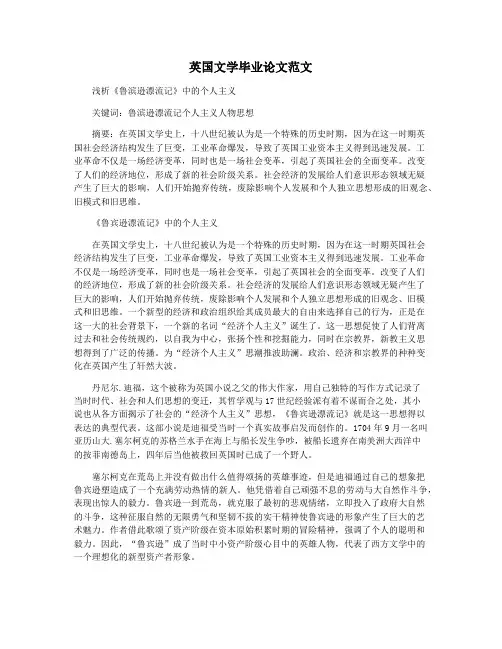
英国文学毕业论文范文浅析《鲁滨逊漂流记》中的个人主义关键词:鲁滨逊漂流记个人主义人物思想摘要:在英国文学史上,十八世纪被认为是一个特殊的历史时期,因为在这一时期英国社会经济结构发生了巨变,工业革命爆发,导致了英国工业资本主义得到迅速发展。
工业革命不仅是一场经济变革,同时也是一场社会变革,引起了英国社会的全面变革。
改变了人们的经济地位,形成了新的社会阶级关系。
社会经济的发展给人们意识形态领域无疑产生了巨大的影响,人们开始抛弃传统,废除影响个人发展和个人独立思想形成的旧观念、旧模式和旧思维。
《鲁宾逊漂流记》中的个人主义在英国文学史上,十八世纪被认为是一个特殊的历史时期,因为在这一时期英国社会经济结构发生了巨变,工业革命爆发,导致了英国工业资本主义得到迅速发展。
工业革命不仅是一场经济变革,同时也是一场社会变革,引起了英国社会的全面变革。
改变了人们的经济地位,形成了新的社会阶级关系。
社会经济的发展给人们意识形态领域无疑产生了巨大的影响,人们开始抛弃传统,废除影响个人发展和个人独立思想形成的旧观念、旧模式和旧思维。
一个新型的经济和政治组织给其成员最大的自由来选择自己的行为,正是在这一大的社会背景下,一个新的名词“经济个人主义”诞生了。
这一思想促使了人们背离过去和社会传统规约,以自我为中心,张扬个性和挖掘能力,同时在宗教界,新教主义思想得到了广泛的传播。
为“经济个人主义”思潮推波助澜。
政治、经济和宗教界的种种变化在英国产生了轩然大波。
丹尼尔.迪福,这个被称为英国小说之父的伟大作家,用自己独特的写作方式记录了当时时代、社会和人们思想的变迁,其哲学观与17世纪经验派有着不谋而合之处,其小说也从各方面揭示了社会的“经济个人主义”思想,《鲁宾逊漂流记》就是这一思想得以表达的典型代表。
这部小说是迪福受当时一个真实故事启发而创作的。
1704年9月一名叫亚历山大.塞尔柯克的苏格兰水手在海上与船长发生争吵,被船长遗弃在南美洲大西洋中的按菲南德岛上,四年后当他被救回英国时已成了一个野人。
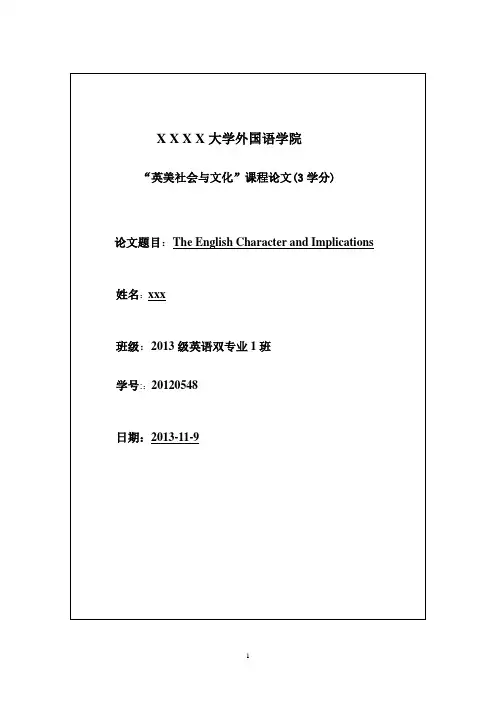
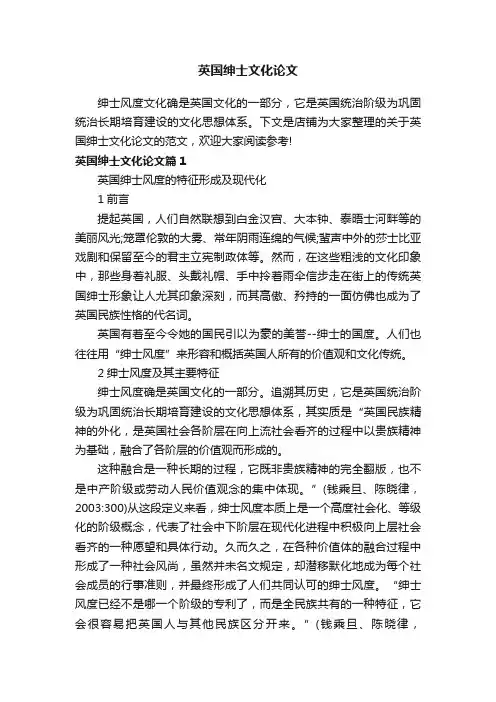
英国绅士文化论文绅士风度文化确是英国文化的一部分,它是英国统治阶级为巩固统治长期培育建设的文化思想体系。
下文是店铺为大家整理的关于英国绅士文化论文的范文,欢迎大家阅读参考!英国绅士文化论文篇1英国绅士风度的特征形成及现代化1前言提起英国,人们自然联想到白金汉宫、大本钟、泰晤士河畔等的美丽风光;笼罩伦敦的大雾、常年阴雨连绵的气候;蜚声中外的莎士比亚戏剧和保留至今的君主立宪制政体等。
然而,在这些粗浅的文化印象中,那些身着礼服、头戴礼帽、手中拎着雨伞信步走在街上的传统英国绅士形象让人尤其印象深刻,而其高傲、矜持的一面仿佛也成为了英国民族性格的代名词。
英国有着至今令她的国民引以为豪的美誉--绅士的国度。
人们也往往用“绅士风度”来形容和概括英国人所有的价值观和文化传统。
2绅士风度及其主要特征绅士风度确是英国文化的一部分。
追溯其历史,它是英国统治阶级为巩固统治长期培育建设的文化思想体系,其实质是“英国民族精神的外化,是英国社会各阶层在向上流社会看齐的过程中以贵族精神为基础,融合了各阶层的价值观而形成的。
这种融合是一种长期的过程,它既非贵族精神的完全翻版,也不是中产阶级或劳动人民价值观念的集中体现。
”(钱乘旦、陈晓律,2003:300)从这段定义来看,绅士风度本质上是一个高度社会化、等级化的阶级概念,代表了社会中下阶层在现代化进程中积极向上层社会看齐的一种愿望和具体行动。
久而久之,在各种价值体的融合过程中形成了一种社会风尚,虽然并未名文规定,却潜移默化地成为每个社会成员的行事准则,并最终形成了人们共同认可的绅士风度。
“绅士风度已经不是哪一个阶级的专利了,而是全民族共有的一种特征,它会很容易把英国人与其他民族区分开来。
”(钱乘旦、陈晓律,2003:311)所以,绅士风度实际上是绅士文化的精神内核,浓缩了英国人的国民性格和民族精神。
首先,绅士风度强调公平合理的竞争原则,不论是在商业、政治或其他带有竞争性质的场合,都应以良好的运动员风格来竞争。
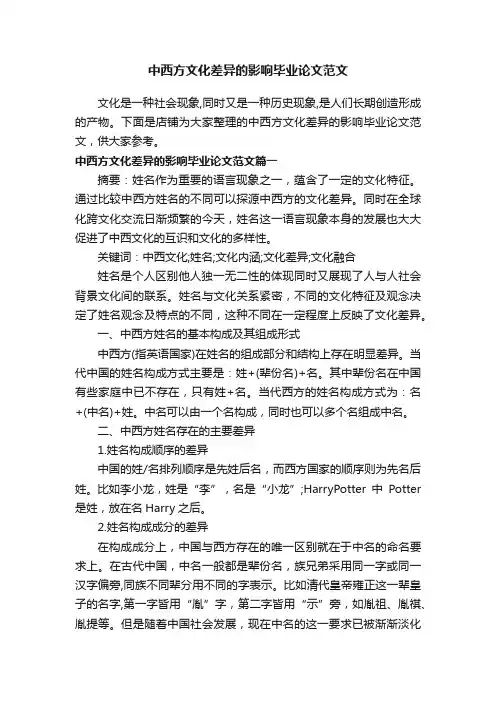
中西方文化差异的影响毕业论文范文文化是一种社会现象,同时又是一种历史现象,是人们长期创造形成的产物。
下面是店铺为大家整理的中西方文化差异的影响毕业论文范文,供大家参考。
中西方文化差异的影响毕业论文范文篇一摘要:姓名作为重要的语言现象之一,蕴含了一定的文化特征。
通过比较中西方姓名的不同可以探源中西方的文化差异。
同时在全球化跨文化交流日渐频繁的今天,姓名这一语言现象本身的发展也大大促进了中西文化的互识和文化的多样性。
关键词:中西文化;姓名;文化内涵;文化差异;文化融合姓名是个人区别他人独一无二性的体现同时又展现了人与人社会背景文化间的联系。
姓名与文化关系紧密,不同的文化特征及观念决定了姓名观念及特点的不同,这种不同在一定程度上反映了文化差异。
一、中西方姓名的基本构成及其组成形式中西方(指英语国家)在姓名的组成部分和结构上存在明显差异。
当代中国的姓名构成方式主要是:姓+(辈份名)+名。
其中辈份名在中国有些家庭中已不存在,只有姓+名。
当代西方的姓名构成方式为:名+(中名)+姓。
中名可以由一个名构成,同时也可以多个名组成中名。
二、中西方姓名存在的主要差异1.姓名构成顺序的差异中国的姓/名排列顺序是先姓后名,而西方国家的顺序则为先名后姓。
比如李小龙,姓是“李”,名是“小龙”;HarryPotter中Potter 是姓,放在名Harry之后。
2.姓名构成成分的差异在构成成分上,中国与西方存在的唯一区别就在于中名的命名要求上。
在古代中国,中名一般都是辈份名,族兄弟采用同一字或同一汉字偏旁,同族不同辈分用不同的字表示。
比如清代皇帝雍正这一辈皇子的名字,第一字皆用“胤”字,第二字皆用“示”旁,如胤祖、胤祺、胤提等。
但是随着中国社会发展,现在中名的这一要求已被渐渐淡化了。
在西方姓名中,中名多为母亲的姓,后来也渐渐发展到借用其他亲属或钦佩的人的名。
比如英国王妃凯特的女儿取名为CharlotteElizabethDiana中Elizabeth就是为了纪念英国女王伊丽莎白二世。
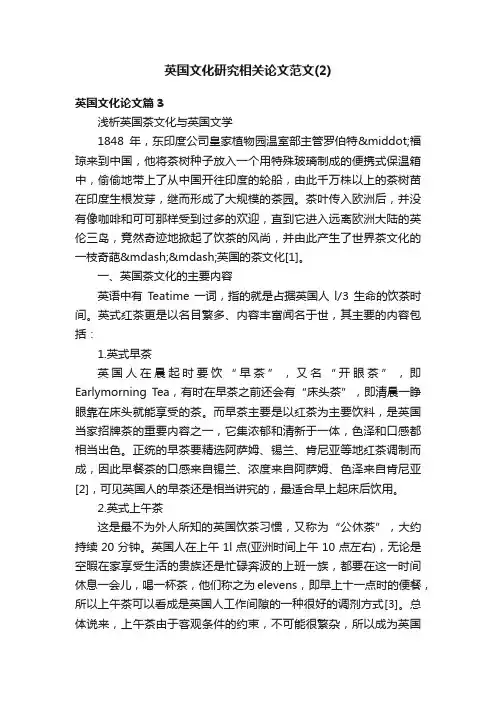
英国文化研究相关论文范文(2)英国文化论文篇3浅析英国茶文化与英国文学1848年,东印度公司皇家植物园温室部主管罗伯特·福琼来到中国,他将茶树种子放入一个用特殊玻璃制成的便携式保温箱中,偷偷地带上了从中国开往印度的轮船,由此千万株以上的茶树苗在印度生根发芽,继而形成了大规模的茶园。
茶叶传入欧洲后,并没有像咖啡和可可那样受到过多的欢迎,直到它进入远离欧洲大陆的英伦三岛,竟然奇迹地掀起了饮茶的风尚,并由此产生了世界茶文化的一枝奇葩——英国的茶文化[1]。
一、英国茶文化的主要内容英语中有Teatime一词,指的就是占据英国人l/3生命的饮茶时间。
英式红茶更是以名目繁多、内容丰富闻名于世,其主要的内容包括:1.英式早茶英国人在晨起时要饮“早茶”,又名“开眼茶”,即Earlymorning Tea,有时在早茶之前还会有“床头茶”,即清晨一睁眼靠在床头就能享受的茶。
而早茶主要是以红茶为主要饮料,是英国当家招牌茶的重要内容之一,它集浓郁和清新于一体,色泽和口感都相当出色。
正统的早茶要精选阿萨姆、锡兰、肯尼亚等地红茶调制而成,因此早餐茶的口感来自锡兰、浓度来自阿萨姆、色泽来自肯尼亚[2],可见英国人的早茶还是相当讲究的,最适合早上起床后饮用。
2.英式上午茶这是最不为外人所知的英国饮茶习惯,又称为“公休茶”,大约持续20分钟。
英国人在上午1l点(亚洲时间上午10点左右),无论是空暇在家享受生活的贵族还是忙碌奔波的上班一族,都要在这一时间休息一会儿,喝一杯茶,他们称之为elevens,即早上十一点时的便餐,所以上午茶可以看成是英国人工作间隙的一种很好的调剂方式[3]。
总体说来,上午茶由于客观条件的约束,不可能很繁杂,所以成为英国茶中最简单的部分。
3.英式下午茶英文名称Afternoon Tea,这其实才是真正意义英国茶文化载体,英国茶正是凭借其内涵丰富、形式优雅的“英式下午茶”——红茶文化享誉世界,“英式下午茶”更是成为英国人典雅生活的象征。

中西方文化之间的差异表现及原因论文精选4篇【摘要】:中西两家因为深受不同的社会文化、历史文化和各种社会背景的影响,从而导致两种不同文化的产生,餐桌礼仪文化业因此应运而生,餐桌礼仪文化是饮食文化的一部分,中西饮食文化的不同是中西民族文化差异的重要组成部分。
每个国家、每个地区的每种民族都在饮食中自觉不自觉的透露着自己深刻的文化背景。
本着重论述中西方在餐桌礼仪文化上的差异,剖析中西方餐桌礼仪文化差异的具体表现渊源。
【关键词】:餐桌礼仪文化差异宴会礼仪(1)在当你应邀赴宴时,你对同桌进餐的人和餐桌上的谈话,大概要比对饮食要更感兴趣。
因此进餐时,应该尽可能地少一些声响,少一些动作。
(2)女主人一拿起餐巾时,你也就可以拿起你的餐巾,放在腿上。
有时餐巾中包有一只小面包;如果是那样的话就把它取也,放在旁边的小碟上。
(3)餐巾如果很大,就双叠着放在腿上;如果很小,就全部打开。
千万别将餐巾别在领上或背心上,也不要在手中乱揉。
可以用餐巾的一角擦去嘴上或手指上的油渍或脏物。
千万别用它来擦刀叉或碗碟。
(4)正餐通常从汤开始。
在你座前最大的一把匙就是汤匙,它就在你的右边的盘子旁边。
不要错用放在桌子中间的那把匙子,因为那可能是取蔬菜可果酱用的。
(5)在女主人拿起她的匙子或叉子以前,客人不得食用任何一道菜。
女主人通常要等到每位客人都拿到菜后才开始。
她不会像中国习惯那样,请你先吃。
当她拿起匙或叉时,那就意味着大家也可以那样做了(6)如果有鱼这道菜的话,它多半在汤以后送上,桌上可能有鱼的一把专用叉子,它也可能与吃肉的叉子相似,通常要小一些,总之,鱼叉放在肉叉的外侧离盘较远的一侧。
(7)通常在鱼上桌之前,鱼骨早就剔净了,如果你吃的那块鱼还有刺的话,你可以左手拿着面包卷,或一块面包,右手拿着刀子,把刺拨开。
(8)如果嘴里有了一根刺,就应悄悄地,尽可能不引起注意地用手指将它取出,放在盘子边沿上,别放在桌上,或扔在地下。
法国餐桌礼仪七忌答应对方的邀请后如果临时有事要迟到甚至取消约会,必须事先通知对方。
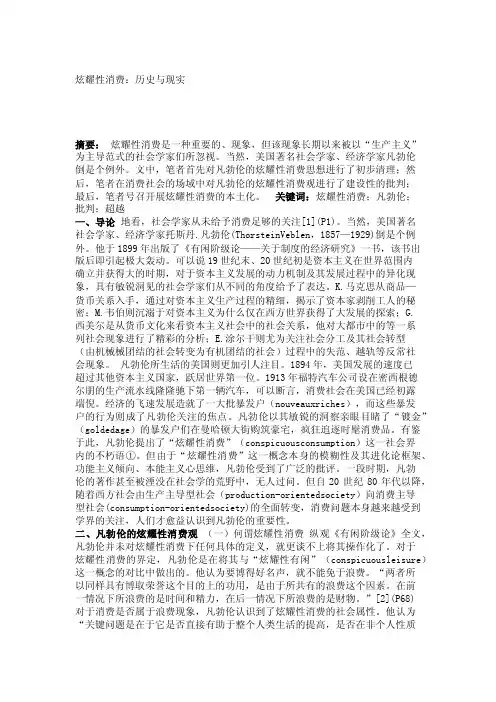
炫耀性消费:历史与现实摘要:炫耀性消费是一种重要的、现象,但该现象长期以来被以“生产主义”为主导范式的社会学家们所忽视。
当然,美国著名社会学家、经济学家凡勃伦倒是个例外。
文中,笔者首先对凡勃伦的炫耀性消费思想进行了初步清理;然后,笔者在消费社会的场域中对凡勃伦的炫耀性消费观进行了建设性的批判;最后,笔者号召开展炫耀性消费的本土化。
关键词:炫耀性消费;凡勃伦;批判;超越一、导论地看,社会学家从未给予消费足够的关注[1](P1)。
当然,美国著名社会学家、经济学家托斯丹.凡勃伦(ThorsteinVeblen,1857—1929)倒是个例外。
他于1899年出版了《有闲阶级论——关于制度的经济研究》一书,该书出版后即引起极大轰动。
可以说19世纪末、20世纪初是资本主义在世界范围内确立并获得大的时期,对于资本主义发展的动力机制及其发展过程中的异化现象,具有敏锐洞见的社会学家们从不同的角度给予了表达。
K.马克思从商品—货币关系入手,通过对资本主义生产过程的精细,揭示了资本家剥削工人的秘密;M.韦伯则沉溺于对资本主义为什么仅在西方世界获得了大发展的探索;G.西美尔是从货币文化来看资本主义社会中的社会关系,他对大都市中的等一系列社会现象进行了精彩的分析;E.涂尔干则尤为关注社会分工及其社会转型(由机械械团结的社会转变为有机团结的社会)过程中的失范、越轨等反常社会现象。
凡勃伦所生活的美国则更加引人注目。
1894年,美国发展的速度已超过其他资本主义国家,跃居世界第一位。
1913年福特汽车公司设在密西根德尔朋的生产流水线隆隆驰下第一辆汽车,可以断言,消费社会在美国已经初露端倪。
经济的飞速发展造就了一大批暴发户(nouveauxriches),而这些暴发户的行为则成了凡勃伦关注的焦点。
凡勃伦以其敏锐的洞察亲眼目睹了“镀金”(goldedage)的暴发户们在曼哈顿大街购筑豪宅,疯狂追逐时髦消费品。
有鉴于此,凡勃伦提出了“炫耀性消费”(conspicuousconsumption)这一社会界内的不朽语①。
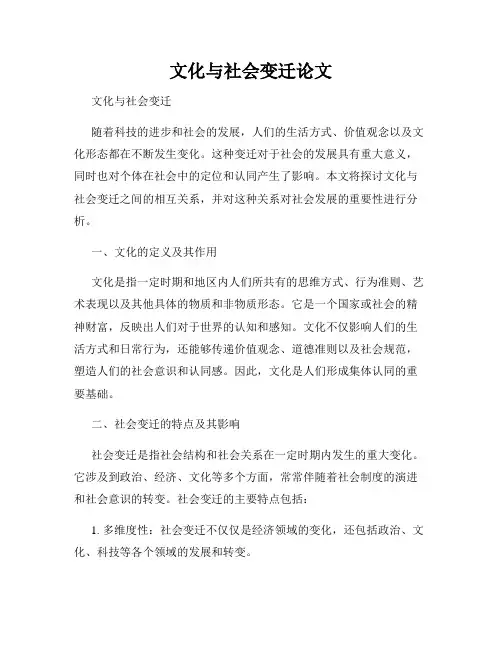
文化与社会变迁论文文化与社会变迁随着科技的进步和社会的发展,人们的生活方式、价值观念以及文化形态都在不断发生变化。
这种变迁对于社会的发展具有重大意义,同时也对个体在社会中的定位和认同产生了影响。
本文将探讨文化与社会变迁之间的相互关系,并对这种关系对社会发展的重要性进行分析。
一、文化的定义及其作用文化是指一定时期和地区内人们所共有的思维方式、行为准则、艺术表现以及其他具体的物质和非物质形态。
它是一个国家或社会的精神财富,反映出人们对于世界的认知和感知。
文化不仅影响人们的生活方式和日常行为,还能够传递价值观念、道德准则以及社会规范,塑造人们的社会意识和认同感。
因此,文化是人们形成集体认同的重要基础。
二、社会变迁的特点及其影响社会变迁是指社会结构和社会关系在一定时期内发生的重大变化。
它涉及到政治、经济、文化等多个方面,常常伴随着社会制度的演进和社会意识的转变。
社会变迁的主要特点包括:1. 多维度性:社会变迁不仅仅是经济领域的变化,还包括政治、文化、科技等各个领域的发展和转变。
2. 渐进性:社会变迁往往是一个渐进的过程,随着时间的推移,社会结构不断发生调整和变动。
3. 革命性:某些历史时期的社会变迁可能会以革命或突发事件为契机而发生,从而导致社会的巨大转型。
社会变迁对文化产生了深远的影响,主要表现在以下几个方面:1. 价值观的转变:随着社会的变迁,人们对于价值观念的认知和追求也在不断改变。
例如,在传统社会中,家庭观念和尊重长辈的价值观念被重视,而在现代社会中,个人的自由和独立则更受重视。
2. 文化形态的变化:社会变迁催生了不同的文化形态。
例如,随着新技术的发展,人们的生活方式发生了很大的改变,如互联网的普及使得虚拟社交成为人们生活的一部分。
3. 社会认同的转变:社会变迁也会影响人们对于社会的认同感。
随着社会的变化,人们可能会对自己的身份和角色有新的认识,从而改变对于社会的认同。
三、文化与社会变迁的相互关系文化和社会变迁是相互影响、相互制约的关系。
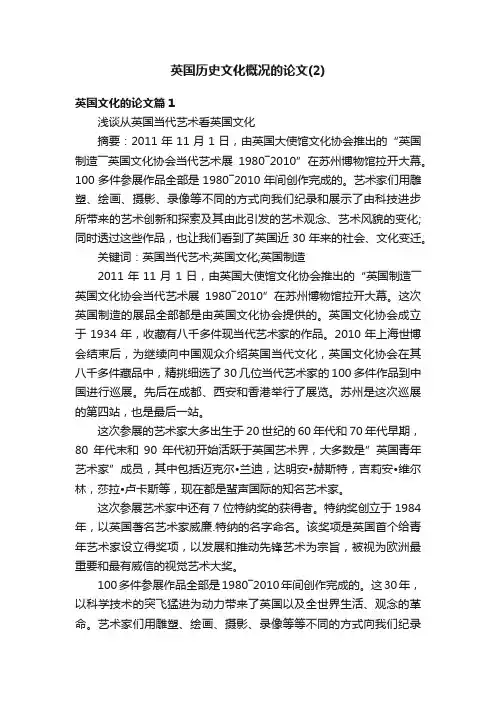
英国历史文化概况的论文(2)英国文化的论文篇1浅谈从英国当代艺术看英国文化摘要:2011年11月1日,由英国大使馆文化协会推出的“英国制造――英国文化协会当代艺术展1980―2010”在苏州博物馆拉开大幕。
100多件参展作品全部是1980―2010年间创作完成的。
艺术家们用雕塑、绘画、摄影、录像等不同的方式向我们纪录和展示了由科技进步所带来的艺术创新和探索及其由此引发的艺术观念、艺术风貌的变化;同时透过这些作品,也让我们看到了英国近30年来的社会、文化变迁。
关键词:英国当代艺术;英国文化;英国制造2011年11月1日,由英国大使馆文化协会推出的“英国制造――英国文化协会当代艺术展1980―2010”在苏州博物馆拉开大幕。
这次英国制造的展品全部都是由英国文化协会提供的。
英国文化协会成立于1934年,收藏有八千多件现当代艺术家的作品。
2010年上海世博会结束后,为继续向中国观众介绍英国当代文化,英国文化协会在其八千多件藏品中,精挑细选了30几位当代艺术家的100多件作品到中国进行巡展。
先后在成都、西安和香港举行了展览。
苏州是这次巡展的第四站,也是最后一站。
这次参展的艺术家大多出生于20世纪的60年代和70年代早期,80年代末和90年代初开始活跃于英国艺术界,大多数是”英国青年艺术家”成员,其中包括迈克尔•兰迪,达明安•赫斯特,吉莉安•维尔林,莎拉•卢卡斯等,现在都是蜚声国际的知名艺术家。
这次参展艺术家中还有7位特纳奖的获得者。
特纳奖创立于1984年,以英国著名艺术家威廉.特纳的名字命名。
该奖项是英国首个给青年艺术家设立得奖项,以发展和推动先锋艺术为宗旨,被视为欧洲最重要和最有威信的视觉艺术大奖。
100多件参展作品全部是1980―2010年间创作完成的。
这30年,以科学技术的突飞猛进为动力带来了英国以及全世界生活、观念的革命。
艺术家们用雕塑、绘画、摄影、录像等等不同的方式向我们纪录和展示了由科技进步所带来的艺术创新和探索及其由此引发的艺术观念、艺术风貌的变化;同时透过这些作品,也让我们看到了英国近30年来的社会、文化变迁。
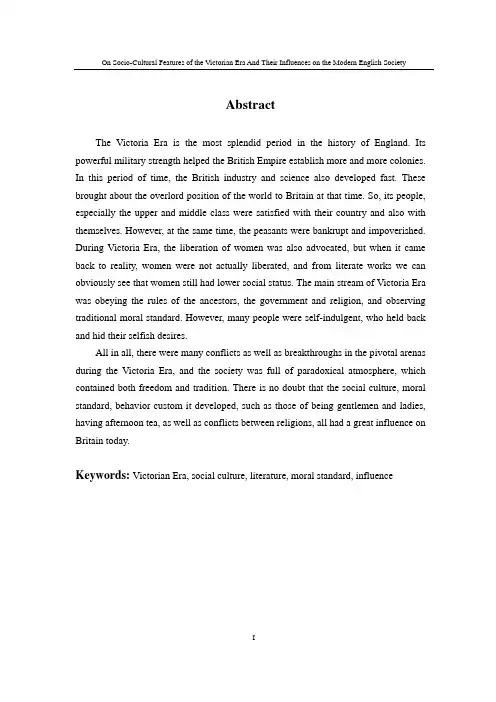
AbstractThe Victoria Era is the most splendid period in the history of England. Its powerful military strength helped the British Empire establish more and more colonies. In this period of time, the British industry and science also developed fast. These brought about the overlord position of the world to Britain at that time. So, its people, especially the upper and middle class were satisfied with their country and also with themselves. However, at the same time, the peasants were bankrupt and impoverished. During Victoria Era, the liberation of women was also advocated, but when it came back to reality, women were not actually liberated, and from literate works we can obviously see that women still had lower social status. The main stream of Victoria Era was obeying the rules of the ancestors, the government and religion, and observing traditional moral standard. However, many people were self-indulgent, who held back and hid their selfish desires.All in all, there were many conflicts as well as breakthroughs in the pivotal arenas during the Victoria Era, and the society was full of paradoxical atmosphere, which contained both freedom and tradition. There is no doubt that the social culture, moral standard, behavior custom it developed, such as those of being gentlemen and ladies, having afternoon tea, as well as conflicts between religions, all had a great influence on Britain today.Keywords: Victorian Era, social culture, literature, moral standard, influence摘要本论文旨在从历史,社会经济,工业科技,军事以及世界环境等五个方面深入分析维多利亚时代的社会特征,社会道德标准,人民对政府及社会的态度以及这些特征对当今英国社会带来的不可忽略的影响。
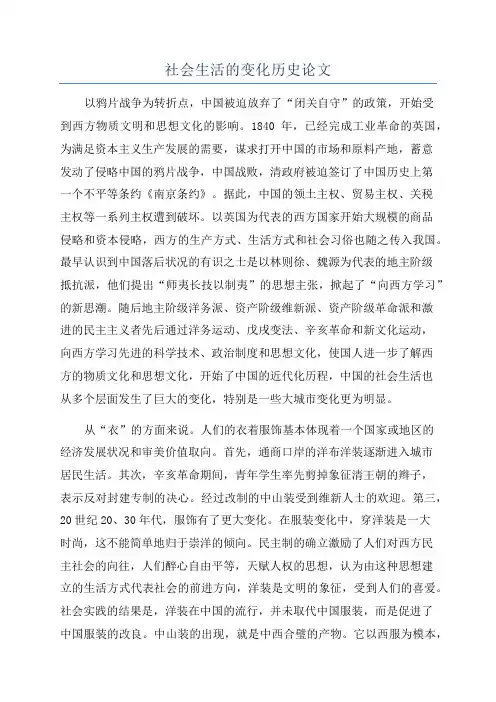
社会生活的变化历史论文以鸦片战争为转折点,中国被迫放弃了“闭关自守”的政策,开始受到西方物质文明和思想文化的影响。
1840年,已经完成工业革命的英国,为满足资本主义生产发展的需要,谋求打开中国的市场和原料产地,蓄意发动了侵略中国的鸦片战争,中国战败,清政府被迫签订了中国历史上第一个不平等条约《南京条约》。
据此,中国的领土主权、贸易主权、关税主权等一系列主权遭到破坏。
以英国为代表的西方国家开始大规模的商品侵略和资本侵略,西方的生产方式、生活方式和社会习俗也随之传入我国。
最早认识到中国落后状况的有识之士是以林则徐、魏源为代表的地主阶级抵抗派,他们提出“师夷长技以制夷”的思想主张,掀起了“向西方学习”的新思潮。
随后地主阶级洋务派、资产阶级维新派、资产阶级革命派和激进的民主主义者先后通过洋务运动、戊戌变法、辛亥革命和新文化运动,向西方学习先进的科学技术、政治制度和思想文化,使国人进一步了解西方的物质文化和思想文化,开始了中国的近代化历程,中国的社会生活也从多个层面发生了巨大的变化,特别是一些大城市变化更为明显。
从“衣”的方面来说。
人们的衣着服饰基本体现着一个国家或地区的经济发展状况和审美价值取向。
首先,通商口岸的洋布洋装逐渐进入城市居民生活。
其次,辛亥革命期间,青年学生率先剪掉象征清王朝的辫子,表示反对封建专制的决心。
经过改制的中山装受到维新人士的欢迎。
第三,20世纪20、30年代,服饰有了更大变化。
在服装变化中,穿洋装是一大时尚,这不能简单地归于崇洋的倾向。
民主制的确立激励了人们对西方民主社会的向往,人们醉心自由平等,天赋人权的思想,认为由这种思想建立的生活方式代表社会的前进方向,洋装是文明的象征,受到人们的喜爱。
社会实践的结果是,洋装在中国的流行,并未取代中国服装,而是促进了中国服装的改良。
中山装的出现,就是中西合璧的产物。
它以西服为模本,改大翻领为立领,四个贴口袋,五个扣。
女性服装一改宽大直筒式的满装,依照西方的人体曲线美加以剪裁,演变成今日的旗袍。
英语国家社会与文化作业引言:随着全球化的不断发展,西方国家的社会与文化也开始引起越来越多人的关注。
而英语国家作为全球最重要的文化输出和交流中心之一,其社会与文化也备受人们关注。
本文将围绕英语国家的社会与文化展开探讨,包括社会结构、价值观念、礼仪习俗等方面,旨在帮助人们更好地了解英语国家的社会与文化。
一、社会结构:英语国家的社会结构经历了漫长的历史和发展,形成了独特的体系。
通常情况下,英语国家的社会结构分为上流社会、中产阶级和工人阶级三个主要阶层。
上流社会通常由富有的商人、政治家和名人组成,享有高度的社会地位和经济优势。
中产阶级则由专业人士、教师和小企业主等组成,他们在社会中享有一定的地位和经济收入。
工人阶级则通常是从事劳动工作,收入和社会地位相对较低。
此外,在英语国家中,还有着不同的种族、宗教和文化群体,这些群体共同构成了英语国家的多元化社会。
这种多元化使英语国家具有不同的文化习俗、宗教信仰和社会价值观念,也为社会的发展增添了色彩。
二、价值观念:英语国家的价值观念主要受到个人主义、自由和民主的影响。
个人主义强调个人权利和个人自由,鼓励人们追求自己的利益和发挥个人才能。
自由是英语国家社会的核心价值观念,包括言论自由、宗教自由、思想自由等。
民主是英语国家政治制度的基石,重视人民的权利和利益,通过选举和参与政治决策来实现。
此外,诚实和诚信也是英语国家的重要价值观念。
在商业活动和人际关系中,诚信和信任被认为是维持社会秩序和稳定的关键。
三、礼仪习俗:英语国家的礼仪习俗体现出其独特的文化特色。
在商务交往方面,英语国家有着一套严格的礼仪规范。
比如,在英国,人们在商务场合通常保持正式的穿着,注重面部表情和手势的控制,态度要谦和有礼。
在澳大利亚和新西兰,商务交往则更加轻松和自由,但仍需要遵守一定的礼貌规范。
在日常生活中,英语国家也有着丰富多样的节日和庆典。
例如,英国有圣诞节和复活节等重要节日,人们会通过家庭聚会和礼物交换来庆祝。
英国文学方面的论文范文大全随着科技的开展,现代教育技术越来越多地被应用到英美文学教学中,同样在高中英语阅读教学中采用课件、视频、音频材料等教学资源,引起学生的兴趣,更好地实现文学教学目的。
英美文学课作为英语专业高年级学生的专业必修课,在教学方案中占有举足轻重的地位。
浅论英美文学与英语阅读教学一.英美文学在高中英语阅读教学上的课程定位(一)英美文学的阅读教学要求《普通高中英语课程标准(实验)》(以下简称《课标》)指出,高中学生学习外语可以促进心智、情感、态度与价值观的开展和综合人文素养的进步。
程爱民(xx:17)认为:“英美文学课的首要目的在于培养学生对英美文学的兴趣,提升学生的文化修养和人文素质,而不仅仅是去进步学生的欣赏程度或是英语程度”。
这很适用于高中阶段的广阔英语学习者。
因此,在高中阶段,一方面,老师从英语教学方面扩大学生接触异国文化的范围,帮助学生拓展视野。
课堂中浸透英美文学不但能促进高中英语教学,而且能实在进步学生的文学素养,培养其多元文化意识,降低跨文化交际的焦虑。
另一方面,英美文学作品是英美社会文化中的精华部分,学生接触到这些作品时,首先大量生动、优美的语句和地道的语言表达为学生提供了原汁原味的英语语料,在一定量的语言“输入”之后,学生的英语程度会在潜移默化中得到进步。
(二)高中学生的自身开展需求英国心理学家Botzlar在谈到培养学生学习兴趣的问题时说:“要不断刺激孩子的好奇心和求知欲。
”虽然在高考的压力下,学生早已厌倦了无休止的语法灌输和乏味的填鸭式教学,但是当代的高中生,他们对新颖事物仍然充满好奇,内心感情丰富,对新知识的学习拥有很强的接收才能。
事实上,笔者在实际的教学操作过程中深化地体会到学生对获知英美文学的强烈渴望,他们尤其喜欢原版小说,学生要求老师在课堂上穿插讲解英美文学的相关知识。
他们希望在阅读、欣赏英美文学的过程中,个人的精神世界也得到极大丰富。
因此,英语课堂教学除了主要围绕考点知识的传授和解题方法的训练,英美文学的阅读教学浸透,更有利于培养有独立意识的学生个体,更有利于学生形成安康的审美观、正确的人生观和价值观。
英国绅士文化英文作文英文:Gentleman culture in the UK is a fascinating topic. As a native Brit, I have grown up surrounded by this culture and have come to appreciate the values and traditions that are associated with being a gentleman.One of the key aspects of gentleman culture in the UK is the importance of manners and etiquette. This includes things like holding doors open for others, saying please and thank you, and being respectful to others. These small gestures may seem insignificant, but they can make a big difference in how people perceive you.Another important aspect of gentleman culture is the way that men dress. In the UK, it is common for men to wear suits and ties to formal events, and even to work in some industries. This shows a level of respect for the occasion and for the people around you.Being a gentleman in the UK also means being chivalrous towards women. This includes things like offering to carry their bags, walking on the outside of the pavement, and standing up when a woman enters the room. These gestures may seem old-fashioned, but they are still appreciated by many women.Overall, gentleman culture in the UK is about showing respect and consideration for others. It is a way of life that has been passed down through generations and is still valued by many people today.中文:英国绅士文化是一个非常有趣的话题。
中英文化差异论文试谈中英颜色词的文化差异摘要: 颜色是一种视觉效果,人们对色彩的视觉感是相同的。
但是这些描述客观事物的颜色词在人们生活中使人产生的联想,受到各个民族的语言习惯、文化传统、地理环境、风俗习惯、历史背景、宗教信仰等因素的影响而产生差异。
本文就红、黄、白、黑六种基本色探讨了中英颜色词内涵的不同,就其象征意义进行了比较研究。
关键词: 颜色词文化差异联想意义语言应用1.引言人类生活在五光十色的自然界中,在日常的生活、生产中创造了十分丰富的颜色词汇,成为人们传递信息、表达事物和思想的重要工具。
作为表达客观视觉感的词语,颜色词丰富了人类的语言,强化了语言的形象。
从理论上讲,人们对它的感知应该是一致的。
然而,各民族由于语言习惯、文化传统、地理环境、风俗习惯、历史背景等的不同,人们总是按照自己的思维定势和价值尺度描绘事物的颜色,赋予事物以自己的民族文化内涵。
颜色一旦浸入文化的染体,在人们的心目中就会产生特定的含义,引起特殊的联想。
因此,即使是同一种颜色在不同民族的心里所引起的联想意义有时候也是大相径庭的。
这种民族文化内涵一旦形成就不易改变,在中英跨文化交流中,这种由民族的特定文化内涵而引起的文化差异比比皆是,给各民族之间的交流造成了很大的障碍。
本文将着重比较中英语言中的颜色词在两种文化中联想意义和语言应用两方面的差异。
2.颜色词在联想意义上的文化差异2.1红色自古以来,中国人的崇红情结是有目共睹的。
在中国文化传统中,红与太阳与火有关,太阳给万物带来生机与温暖,而火意味着光明与兴旺。
所以红色象征着幸福、喜庆、吉祥、成功、好运。
在中国,红色都是运用在美好吉利的事物上。
从中国文化中意味着人生大事的传统婚俗习惯中便可看出:新娘子要穿红衣,盖红盖头,坐大红轿。
新娘也要披红,新房则是红色的海洋:红喜字、红蜡烛、红被褥、红箱笼……亲朋好友要送“红包”,媒人叫“红娘”。
红色不仅给婚礼带来喜庆欢快的气氛,而且寓意着新婚夫妻婚后日子的幸福、红火。
British Parliament: Mother of Parliaments When it comes to British Parliament, the first impression occurs to us is “Mother of Parliaments”. We are told that many other countries followed the model of Britain to establish their own parliaments. However, what made British Parliament “Mother of Parliament”? Below are some of my points.First, it has the longest history. In 1215, the lords forced King John to sign the Great Charter, which covered two important matters: no tax should be made without the approval of the council, and no freedom should be arrested or imprisoned except by the law of the land(Chang Junyue, p.50). After King John died, his son, Henry III, wanted to defeat the lords and their charter but failed. This time, the lords forced him to accept the charter and the “parliament”, including the lords, churchmen and knights from each county. In order to raise funds for wars, Edward I opened a new parliament in 1295. People called it the model parliament because its composition became the model for later parliaments. The model parliament is the beginning of British Parliament.Second, it always struggled to limit the monarchy. Since its birth, Parliament has started the fight against autocracy. There were a lot of despots in ancient Britain. They were irreconcilable with Parliament and intended to withdraw its powers. Therefore, Parliament used various methods to protect itself and constrained the king’s power. It influenced the state affairs by petitioning to the king, weakened the monarchy by financial powers and even threatened the king by wars. At last, Parliament managed to defeat the monarchy and make it work for parliamentary sovereignty. Because of these, British Parliament is known as “the cradle of democracy”.Third, it created new electoral system. Before the early nineteenth century, the electoral system of Parliament was under control of the king, so feudal officials and rich people could manipulate elections. Nevertheless, since 1832, Parliament carried out a series of reforms. These reform measures gradually abolished restrictions on property and gender of voters and determined the constituencies by administrative divisions. Thus common people could enter Parliament to participate into politics, which accelerated the process of democratization in UK.Forth, it also created party system. Before the mid-19th century politics in Britain was already dominated by the Whigs and the Tories, but they were not political parties in the modern sense. After the reforms, both evolved into the political parties and party system came to mature: the leader of the party with most members in the House of Commons becomes Prime Minister and he chooses other Ministers from his own party colleagues. The party with the next largest number becomes the Opposition. This system makes political parties in Parliament more systematized and institutionalized. Also, competition between the Ruling and the Opposition makes Parliament more democratic.In conclusion, British Parliament is one of the earliest democratic political institutions in human history. Its originality brings it the title of “Mother of Parliaments” and its spirit will influence the world forever.Bibliography常俊跃,英国历史文化,北京:北京大学出版社,2010朱永涛,Essentials of British and American Cultures, 北京:外语教学与研究出版社,2007。
欧洲走向近代历史小论文欧洲拥有悠久而辉煌的历史。
但是最为重要的是近代欧洲崛起。
一、近代欧洲崛起的原因1、从地理位置上来说,游牧民族侵略线的最东端是中国北部,最西线是罗马帝国北边的匈牙利,线路属于单向由东向西推,这是罗马帝国崩溃的原因,这也是欧洲近代能够崛起的先决条件之一。
2、政治上,政治生存条件发生了剧变,整个社会已慢慢向资本主义的方向进行了,意味着民族主义的逐渐兴起,民族国家的逐渐形成,另外,新军事革命兴起,革命军队与资产阶级联盟。
马基雅维利《君主论》,也从思想上为欧洲的崛起奠定了政治基础。
3、经济上,工业革命促进生产力、资本经济的发展,人口增长,农业发展,贸易扩大。
维京人解除威胁、十字军远征、和蒙古帝国的建立都是贸易发展的动力。
新的经商制度的运用,如:标准货币、银行信用票据,股份公司等,促进了商业的发展4、技术上,科技的发展,造船,航海,等技术的发展极大地促进了经济的扩大,也为海军装备提更了有力的保障,武装远航商船使西方的海军大国最终取得了控制海洋商路和所有易受海军攻击的社会的有利地位,它意味着欧洲的世界地位大大提高了一步。
5、对外,殖民掠夺,侵略扩张6、文化上,文艺复兴、启蒙运动等解放了思想,极大地促进欧洲精神面貌的变化,对于近代欧洲的全面崛起着重要的推动作用。
宗教改革,宗教好战精神使国家观念增强,新君主制得到巩固,资产阶级崛起。
这些都对近代欧洲的崛起起到了促进作用。
二、近代欧洲大事件15世纪末以来,以地理大发现、宗教改革、民族国家的崛起为标志,欧洲进入近代时期。
近代包括从中世纪到工业革命为止的三个世纪,大约从1500至1800年,或者从1492年发现新世界到1789年法国大革命为止。
这个时期的特点是科学的重要性上升,技术进步突飞猛进,世俗公民政治和民族国家异军突起。
资本主义经济从意大利北部诸共和政体如热那亚等开始萌芽发展。
近代也见证了重商主义经济理论的发展及占据主导。
自然,近代也代表了在大部分欧洲地区封建社会、农奴制以及罗马天主教会的权威的衰落与最终消失。
British Parliament: Mother of Parliaments When it comes to British Parliament, the first impression occurs to us is “Mother of Parliaments”. We are told that many other countries followed the model of Britain to establish their own parliaments. However, what made British Parliament “Mother of Parliament”? Below are some of my points.
First, it has the longest history. In 1215, the lords forced King John to sign the Great Charter, which covered two important matters: no tax should be made without the approval of the council, and no freedom should be arrested or imprisoned except by the law of the land(Chang Junyue, p.50). After King John died, his son, Henry III, wanted to defeat the lords and their charter but failed. This time, the lords forced him to accept the charter and the “parliament”, including the lords, churchmen and knights from each county. In order to raise funds for wars, Edward I opened a new parliament in 1295. People called it the model parliament because its composition became the model for later parliaments. The model parliament is the beginning of British Parliament.
Second, it always struggled to limit the monarchy. Since its birth, Parliament has started the fight against autocracy. There were a lot of despots in ancient Britain. They were irreconcilable with Parliament and intended to withdraw its powers. Therefore, Parliament used various methods to protect itself and constrained the king’s power. It influenced the state affairs by petitioning to the king, weakened the monarchy by financial powers and even threatened the king by wars. At last, Parliament managed to defeat the monarchy and make it work for parliamentary sovereignty. Because of these, British Parliament is known as “the cradle of democracy”.
Third, it created new electoral system. Before the early nineteenth century, the electoral system of Parliament was under control of the king, so feudal officials and rich people could manipulate elections. Nevertheless, since 1832, Parliament carried out a series of reforms. These reform measures gradually abolished restrictions on property and gender of voters and determined the constituencies by administrative divisions. Thus common people could enter Parliament to participate into politics, which accelerated the process of democratization in UK.
Forth, it also created party system. Before the mid-19th century politics in Britain was already dominated by the Whigs and the Tories, but they were not political parties in the modern sense. After the reforms, both evolved into the political parties and party system came to mature: the leader of the party with most members in the House of Commons becomes Prime Minister and he chooses other Ministers from his own party colleagues. The party with the next largest number becomes the Opposition. This system makes political parties in Parliament more systematized and institutionalized. Also, competition between the Ruling and the Opposition makes Parliament more democratic.
In conclusion, British Parliament is one of the earliest democratic political institutions in human history. Its originality brings it the title of “Mother of Parliaments” and its spirit will influence the world forever.
Bibliography
常俊跃,英国历史文化,北京:北京大学出版社,2010
朱永涛,Essentials of British and American Cultures, 北京:外语教学与研究出版社,2007。